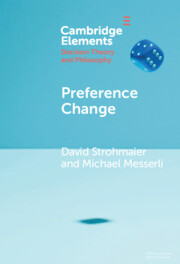194 results
2 - Principles of Rational Behavior in Society and Business
- from Book I - The Market Economy, Overview, and Applications
-
- Book:
- Microeconomics for Managers
- Published online:
- 22 March 2024
- Print publication:
- 28 March 2024, pp 46-86
-
- Chapter
- Export citation
Religious Miracles versus Magic Tricks
-
- Article
-
- You have access
- Open access
- HTML
- Export citation
The Reflection Principle and the Ex-Ante Pareto Principle in Anna Mahtani’s Objects of Credence
-
- Journal:
- Economics & Philosophy , First View
- Published online by Cambridge University Press:
- 26 March 2024, pp. 1-7
-
- Article
- Export citation
Are There Counterexamples to the Consistency Principle?
-
- Article
-
- You have access
- Open access
- HTML
- Export citation
Chapter 10 - The Illusion-Motivation Model of Revolution
- from Part IV - Reevaluating Revolutions
-
- Book:
- The Psychology of Revolution
- Published online:
- 07 March 2024
- Print publication:
- 14 March 2024, pp 155-169
-
- Chapter
- Export citation
8 - Exploring Sen on self-interest and commitment
- from Part II - Inclusiveness, Social and Individual Agency
-
-
- Book:
- Social Choice, Agency, Inclusiveness and Capabilities
- Published online:
- 28 March 2024
- Print publication:
- 14 March 2024, pp 170-201
-
- Chapter
- Export citation
Hayek's extended mind: on the (im)possibility of Austrian behavioural economics
-
- Journal:
- Journal of Institutional Economics / Volume 20 / 2024
- Published online by Cambridge University Press:
- 07 March 2024, e19
-
- Article
-
- You have access
- Open access
- HTML
- Export citation
Chapter 13 - Reimagining Society
-
-
- Book:
- Nineteenth-Century Literature in Transition: The 1860s
- Published online:
- 01 February 2024
- Print publication:
- 08 February 2024, pp 238-253
-
- Chapter
- Export citation
The Methodologically Flawed Discussion about Deep Disagreement
-
- Journal:
- Episteme , First View
- Published online by Cambridge University Press:
- 05 February 2024, pp. 1-17
-
- Article
-
- You have access
- Open access
- HTML
- Export citation

Preference Change
-
- Published online:
- 11 January 2024
- Print publication:
- 01 February 2024
-
- Element
-
- You have access
- Open access
- HTML
- Export citation
9 - Politeness Theories
-
- Book:
- Chinese Politeness
- Published online:
- 02 November 2023
- Print publication:
- 16 November 2023, pp 151-175
-
- Chapter
- Export citation
The Value of Risk in Transformative Experience
-
- Journal:
- Episteme , First View
- Published online by Cambridge University Press:
- 13 November 2023, pp. 1-13
-
- Article
-
- You have access
- Open access
- HTML
- Export citation
1 - Introduction: Why War?
-
- Book:
- Formal Models of Crisis Bargaining
- Published online:
- 30 November 2023
- Print publication:
- 09 November 2023, pp 1-8
-
- Chapter
- Export citation
8 - Del Pezzo Fibrations
-
- Book:
- Complex Algebraic Threefolds
- Published online:
- 29 September 2023
- Print publication:
- 19 October 2023, pp 324-358
-
- Chapter
- Export citation
7 - Conical Fibrations
-
- Book:
- Complex Algebraic Threefolds
- Published online:
- 29 September 2023
- Print publication:
- 19 October 2023, pp 285-323
-
- Chapter
- Export citation
6 - The Sarkisov Category
-
- Book:
- Complex Algebraic Threefolds
- Published online:
- 29 September 2023
- Print publication:
- 19 October 2023, pp 249-284
-
- Chapter
- Export citation
The Rationality of COVID-19 Vaccine Hesitancy
-
- Journal:
- Episteme , First View
- Published online by Cambridge University Press:
- 06 October 2023, pp. 1-20
-
- Article
-
- You have access
- Open access
- HTML
- Export citation
1 - Rationality and Closed-System Reasoning
- from Part I - The Materialist Utopias
-
- Book:
- Late Soviet Britain
- Published online:
- 14 September 2023
- Print publication:
- 28 September 2023, pp 23-50
-
- Chapter
- Export citation
Reasoning with reasons: Lewis on common knowledge
-
- Journal:
- Economics & Philosophy , First View
- Published online by Cambridge University Press:
- 05 September 2023, pp. 1-22
-
- Article
-
- You have access
- Open access
- HTML
- Export citation
Artificial Intelligence and the Problem of Judgment
-
- Journal:
- Ethics & International Affairs / Volume 37 / Issue 2 / Summer 2023
- Published online by Cambridge University Press:
- 29 August 2023, pp. 232-243
-
- Article
-
- You have access
- Open access
- HTML
- Export citation



